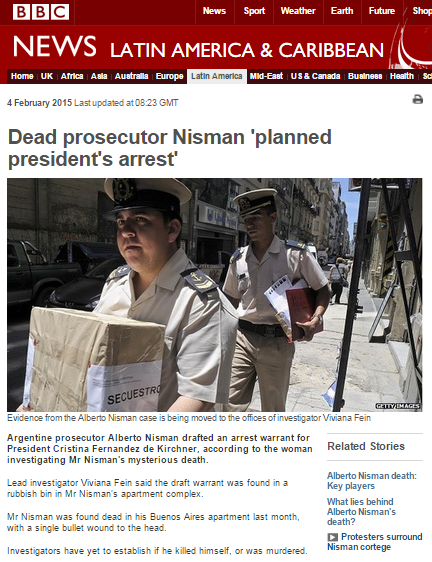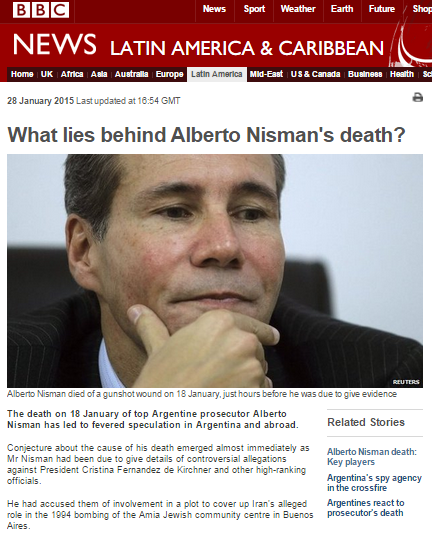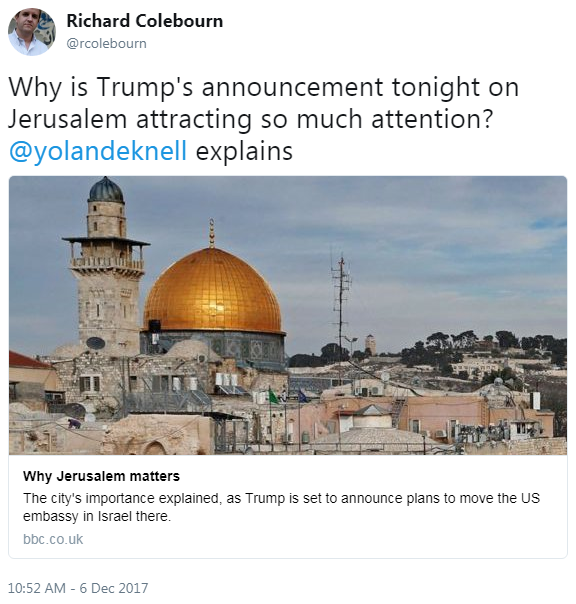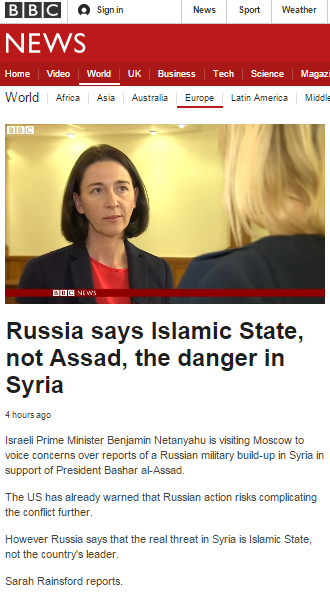Readers of an article titled “Dead prosecutor Nisman ‘planned president’s arrest’” which appeared on the BBC News website’s Latin America & Caribbean page on February 4th found the statement highlighted below at the end of its seventh paragraph.
“Mr Nisman had been investigating the 1994 bombing of a Jewish centre in Buenos Aires which killed 85 people.
He died hours before he was due to testify in Congress against President Fernandez, whom he had accused of covering up alleged Iranian involvement in the 1994 attack.
President Fernandez has denied the allegation. Iran has also denied involvement in the attack.” [emphasis added]
Of course that statement is accurate: Iran has indeed denied involvement in the 1994 AMIA bombing and there is no reason why the BBC should not make audiences aware of that fact. However, it should also inform them of the wealth of evidence available which indicates that Iran’s denial of involvement is to be viewed with a considerable amount of scepticism and this article does not go on to do that.
But perhaps, one might assume, that information – crucial to understanding the story as a whole – is available to BBC audiences in the related stories appended to this report. The one titled “What lies behind Alberto Nisman’s death?” would obviously be a good candidate so let’s take a look at what readers of that backgrounder are told about Iranian involvement in the terror attack which killed 85 people.
Under the sub-heading ‘Why was the Amia community centre targeted?’ readers are informed that:
“The attack on the Amia community centre came two years after 29 people died in an attack on the Israeli embassy in Buenos Aires.
A group calling itself Islamic Jihad Organisation said it was responsible for the 1992 attack.
The group alleged the bombing was in revenge for the killing by Israel of Hezbollah leader Abbas al-Mussawi that same year.
Jewish and Israeli institutions abroad were seen as “soft targets”, easier to attack than similar buildings in Israel.
Theories therefore soon surfaced pointing the finger for the Amia bombing at Hezbollah, a mainly Shia group backed by Iran.
Iran has denied any involvement in either of the attacks.” [emphasis added]
The section titled ‘Who was behind the Amia attack?’ provides no answers to that question whilst the section headed ‘Who were the suspects?’ merely states:
“From the beginning, investigators suspected Iranian officials may have been behind the bombing.”
Readers have to reach the sixth section titled ‘What did Mr Nisman uncover?’ in order to find out that:
“In 2006, Mr Nisman formally charged Iranian officials with directing the Amia attack, which he alleged was carried out by Hezbollah militants.
In his most recent report, published just days before his death, he furthermore accused President Fernandez and Foreign Minister Hector Timerman of covering up the Iran’s purported role in the bombing.
He alleged that the government wanted to whitewash Iran in order to secure lucrative trade deals with Iran, exchanging Argentine grain for Iranian oil.
President Fernandez dismissed the allegations as “absurd”.”
Another of the ‘related stories’ promoted to BBC audiences under the title “Alberto Nisman death: Key players” tells readers that:
“He [Mr Nisman] was seen as a reinvigorating force and in 2006, he officially accused the Iranian government of directing the bombing. But Iran refused to hand over a number of suspects.
In 2013, the Argentine government reached an agreement with Iran – they would jointly investigate the attack. Some critics felt this was a way of undermining Mr Nisman’s investigation.”
In other words, even those readers who bothered to click on the links to the ‘related stories’ are not provided with any insight into what caused those involved in investigating the AMIA bombings for more than 20 years – including Alberto Nisman – to reach the conclusion that Iran was involved.
That information can be found in the backgrounder prepared by our CAMERA colleagues Ricki Hollander and Marcelo Wio: “The AMIA Attack: Terrorism, Cover-Up and the Implications for Iran“. Additional information – including a link to a translation of Alberto Nisman’s report – is available in testimony submitted to the US House Committee on Foreign Affairs by Dr Matthew Levitt in 2013.




